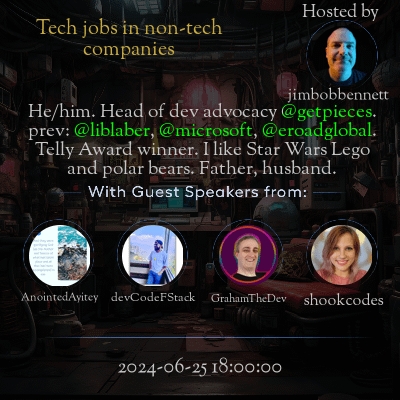Tech jobs in non-tech companies
This space is hosted by jimbobbennett
Space Summary
The space discussion revolved around the importance of digitization in today’s tech-driven world, emphasizing the impact on various industries and sectors. Participants delved into the opportunities for tech careers, highlighting the need for education and upskilling in programming. The conversation also touched upon the growing trend of non-tech companies adopting digital strategies. Overall, the space provided valuable insights into the intersection of technology, education, and career opportunities.
Questions
Q: What is the significance of differentiated content creation?
A: Differentiation addresses unmet needs and taps into untapped markets.
Q: How did the speaker contemplate transitioning to non-tech roles?
A: The focus was on aligning tech skills with community opportunities for impact.
Q: What opportunities were highlighted for tech involvement in communities?
A: The discussion revolved around advancing or optimizing community systems for progress.
Highlights
Time: 00:02:19
Introduction to Twitter Space Hosting, Host’s first experience with hosting a Twitter Space.
Time: 00:19:48
Work-Life Balance Discussion, Importance of finding a work-life balance that suits individual needs.
Time: 00:35:31
Tech Skills in Non-Tech Roles, How tech skills can enhance roles in non-tech companies.
Time: 00:41:06
Encouragement for Content Creation, Encouragement to share personal projects and insights online to build a professional presence.
Time: 00:48:05
Importance of Portfolio Building, Importance of side projects and building a portfolio to demonstrate skills.
Time: 00:57:41
Value of Community Engagement in Career Moves, Discussion on the value of community engagement when planning career moves.
Key Takeaways
- 1. Content differentiation addresses unmet needs and taps into new markets.
- 2. Transitioning to non-tech roles while leveraging tech skills was explored as a strategy.
- 3. Opportunities in tech involve advancing communities or optimizing existing systems.
- 4. Analyzing and filling gaps is essential for personal and community growth.
Behind the Mic
Hey, Graham, thanks for being with us today. It’s great to be chatting with you. Hi, Graham, so good to have you here. How are you? Good, thanks. Thanks for having me. So, what are we talking about today? We’re diving into the challenges of remote work. Specifically, how to stay productive and connected. Awesome. So, Graham, how do you stay productive while working remotely? Well, it’s all about setting boundaries and sticking to a routine. Absolutely. And tools. What tools do you recommend? I swear by Asana and Slack. They help keep projects on track and communication flowing. Those are great. Sarah, what are your thoughts? I completely agree with Graham. Also, having a dedicated workspace makes a huge difference. Definitely. And what about staying connected with your team? Frequent check-ins and video calls are key. Virtual coffee breaks can be fun too. That sounds nice. Let’s not forget mental health. How do you avoid burnout? Taking regular breaks and prioritizing self-care. It’s crucial. Such valuable advice. Any final tips? Don’t be afraid to over-communicate. Clarity is everything. Great point. Well, thank you both for sharing your insights. It was a pleasure. Thanks for having me. Yeah, thank you. Bye, everyone. Bye. Take care.







